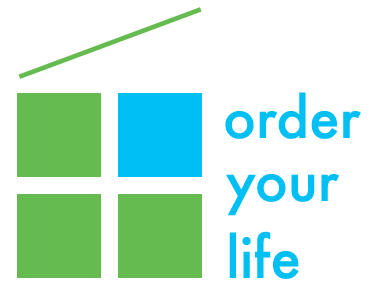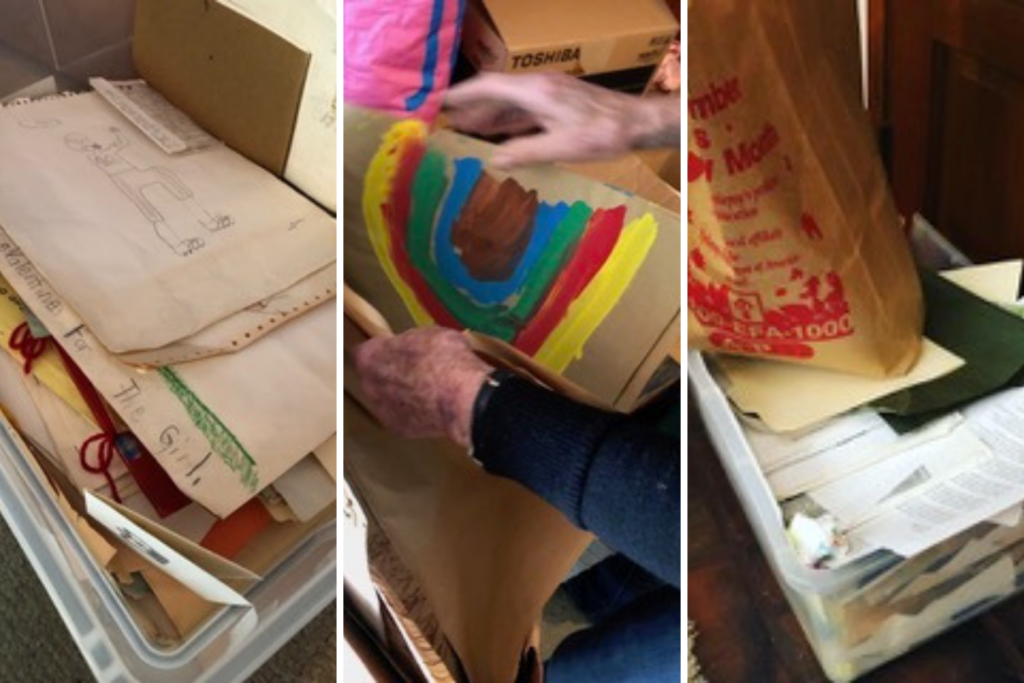Do you have decades’ worth of paper clutter in your garage or home office? Are you ready to let go of it? Scanning and storing your papers as computer files will give you the security of knowing you can access them any time. And doing it all in one fell swoop – working several consecutive days rather than, say, one day a week over several weeks – makes it easier for a professional organizer like me to help you accomplish this efficiently and effectively.
My busy week in LA tackling decades of a client’s paper clutter
A long-time DC area client recently asked me if I’d be willing to travel to LA to work with her 80-year-old mother (we’ll call her Barbara) to help go through decades of accumulated paper. She felt strongly that she didn’t want to burden her two daughters to deal with it all. While she was ready to let go of most of the paper, she needed help in order to face it, both emotionally and physically. She also wanted to keep many of the documents so our plan was to scan them. I jumped at the chance. As almost all of my paper organizing jobs take place over many months, I was eager to see what I could accomplish in a week.
Organizing our task
In April, I flew out to LA to meet Barbara and work in her home. We scheduled six hours a day for five days in a row. She had 3 file cabinets full of paper, at least a dozen boxes with assorted photos, her mother’s writing, and travel memorabilia. I was joined by a longtime friend of mine who lives in the LA area. She worked with me as an assistant, doing the scanning as I helped Barbara make decisions about what to discard, what to keep, and how to organize it.
To scan and digitize the documents she wanted to keep, we used the Fujitsu ScanSnap iX500. This particular model can scan 50 pages double sided in under 2 minutes. For the job we were doing, it was an essential tool. Barbara had just purchased a new PC laptop, so we used Microsoft One Drive to create an organizational file system for each of her newly scanned documents. This made it possible for her to access the files on her phone, iPad and other devices. As Barbara and I decided how to handle each document, we put the papers in folders with file names. Each folder had a sticky note attached to it. We were careful to name each file in a way that would make sense to Barbara for her new digital filing system.
In some cases, such as with property deeds, insurance policies, loan payoff statements and other vital documents, we kept the originals of the paper in well-labeled files. But in most cases, the paper versions were designated either for shredding or for the recycle bin. We sorted out the photos that were mixed in with other papers. Next we set the photos aside in a separate box to send to scancafe.com for digitizing. Prior to my arrival, Barbara had already sent them over 7,000 pictures and slides!
Our accomplishments
By the end of the week, we had completely emptied one four-drawer file cabinet. We had accumulated 3 50-gallon containers filled with paper to be recycled. We set aside several boxes for shredding. In the process, we also cleaned and organized her office shelves and desk drawers, found lots of old recyclable electronics and created a desktop file box for immediate access to her most urgent action items. Most importantly, Barbara learned the process of how to go through her files and decide how to best preserve each item. After I left, she had the confidence to tackle her travel memorabilia and other personal papers on her own.
My takeaways
- You can get a lot more accomplished in five consecutive days than you can working one day a week for five weeks. It’s easy to pick up where you left off yesterday, but not so easy to remember what you did a week or a month ago.
- Having more time means you can see the bigger picture and work more efficiently. Three-hour appointments, although effective, significantly limit the scope of what can be accomplished over a longer period of time.
- You can greatly increase your efficiency with a helper. As my assistant did the scanning, I was free to help the client make the harder decisions about what to keep and scan, what to shred, and how to organize the paper and digital files.
- Using a dedicated document scanner will guarantee optimal preservation of all your important papers. I chose the Fujitsu ScanSnap iX500 because it helps overcome a huge stumbling block for people like Barbara who fear letting go of sentimental papers (such as her mother’s writing, her own journals, and other personal memorabilia). Scanning the paper made it easier for Barbara, knowing that it would be scanned, named and organized in a way that she could easily find it.
In a single week we were able to help Barbara clear decades of paper clutter. Now her files and important papers are at her fingertips where she can find them, and she is relieved of the worry of leaving it for her daughters to deal with. The paper clutter around you may be costing you more than you realize in calmness, time, money and productivity. Are you ready to get it scanned and organized?


